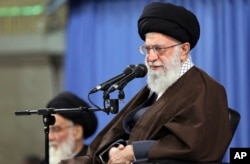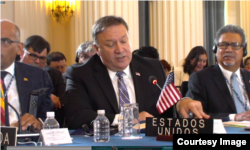Iran will not cooperate more fully with atomic inspectors until a standoff over its nuclear deal is resolved, its U.N. envoy said, as one signatory warned Tehran against moving ahead with preparations to boost its uranium enrichment capacity.
Tehran, meanwhile, signaled its resolve to expand its enrichment capability by detailing plans to build advanced centrifuges — the machines that enrich uranium.
European powers have been scrambling to salvage the agreement they signed in 2015 since U.S. President Donald Trump pulled Washington out last month and said he would reimpose far-reaching U.S. sanctions on Iran.
Foreign and finance ministers from those three countries — France, Britain and Germany — have written to U.S. officials to stress their commitment to upholding the pact, and to urge Washington to spare EU firms active in Iran from secondary sanctions.
An Iranian withdrawal from the deal, which lifted sanctions on Tehran in exchange for curbs on its nuclear program, would "further unsettle a region where additional conflicts would be disastrous," the ministers wrote in the letter dated June 4 and seen by Reuters on Wednesday.
Since the U.S. pullout was announced, authorities in Tehran have sent mixed signals on whether they believe the nuclear deal's remaining signatories, which also include China and Russia, can salvage it.
Supreme Leader Ayatollah Khamenei said on Monday he had ordered preparations to increase uranium enrichment capacity if the agreement collapsed.
Tehran also informed the International Atomic Energy Agency (IAEA), the U.N. nuclear watchdog that polices restrictions placed on its activities under the deal, of "tentative" plans to produce the feedstock for centrifuges.
In Paris on Wednesday, French Foreign Minister Yves Le Drian told Europe 1 radio that, while that initiative remained within the framework of the nuclear deal, it was unwelcome and risked sailing close to a "red line."
Emphasizing that Tehran's patience with European efforts to save the deal was not unlimited, its envoy to the IAEA said it had granted the three powers a few weeks.
"A few weeks means a few weeks, not a few months," Reza Najafi said outside a quarterly meeting of the agency's Board of Governors in Vienna.
Standoff
He also dismissed calls by the IAEA to go the extra mile in cooperating with the nuclear watchdog's inspectors, telling reporters that, while the standoff over the deal continued, "no one should expect Iran to go to implement more voluntary measures."
"But I should emphasize that it does not mean that right now Iran will restart any activities contrary to the [deal]," Najafi added. "These are only preparatory works."
Iran's nuclear chief on Wednesday inaugurated work on a facility in Natanz plant in central Iran designed to build advanced centrifuges and said the center would be fully functional in a month.
"After the supreme leader's order we prepared this center within 48 hours. We hope the facility to be completed in a month," Ali Akbar Salehi, the head of Iran's Atomic Energy Organisation, said on state television.
Although the move was not a violation of the nuclear deal, it sent a strong signal to the West that Tehran would not succumb to the pressures.
Answering a question about a remark by U.S. Secretary of State Mike Pompeo last month that Iran must halt all uranium enrichment, Salehi said: "We are far beyond that point. That man has been talking for himself."
The agency has said Tehran is implementing its commitments, but also called for "timely and proactive cooperation" on providing access for snap inspections.
Diplomats who deal with the agency say an inspection in late April went down to the wire in terms of how quickly the IAEA team gained access to one site.







